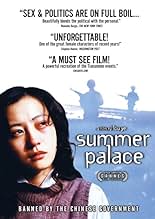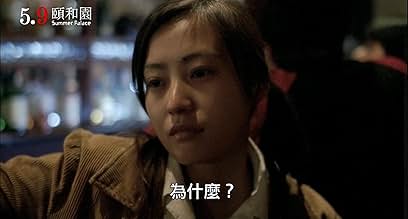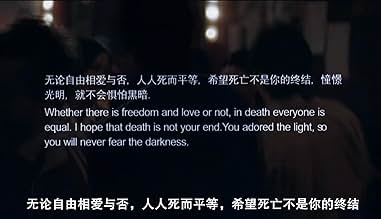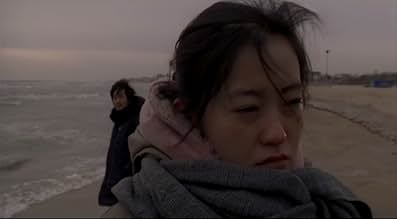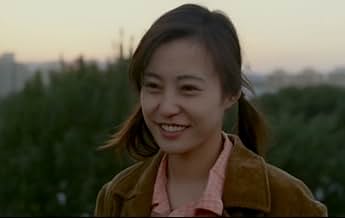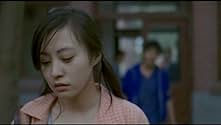IMDb-BEWERTUNG
7,2/10
4835
IHRE BEWERTUNG
Füge eine Handlung in deiner Sprache hinzuYu Hong leaves her home village and starts university in Beijing, where she develops a consuming and compulsive relationship with another student. The student riots from 1989 then ensue and ... Alles lesenYu Hong leaves her home village and starts university in Beijing, where she develops a consuming and compulsive relationship with another student. The student riots from 1989 then ensue and take a toll on their lives.Yu Hong leaves her home village and starts university in Beijing, where she develops a consuming and compulsive relationship with another student. The student riots from 1989 then ensue and take a toll on their lives.
- Auszeichnungen
- 1 Nominierung insgesamt
Empfohlene Bewertungen
I thought this film was a fascinating portrait of Chinese youth and culture, as they struggle through some astoundingly turbulent times. Coming into maturity while defining love, commitment, and one's self is a challenging part of any youth's life, but all the more so as part of a society that is struggling through the same challenges itself. I found interesting analogies of the Chinese village in the character of Yu Huong, and the big city in Zhou Wei. Somewhere around college age, we all attempt to define what is important to us and explore what we can do, can be, and want. Some of that experience is sorting through our history - family, village, cultural - and deciding what we want to carry forward and embrace, and what to rebel against and discard, and I believe that this film paints a lovely, if gritty, portrayal of modern China doing just that. In their dorm rooms, in the bars and restaurants, in their homes, in their hearts. On the one hand, I would have, aesthetically, enjoyed a more sumptuous, smooth production; but that is not modern China. China (what admittedly little of it I've seen) is gritty, sweaty, crowded, noisy, straining, and that's what I see in this film.
This Cannes Festival 2006 entry by the director of Suzhou River and Purple Butterfly (enjoyng very limited US theatrical release in early 2008) is more unwieldy but also bolder and more authentic than its predecessors, while still as moony and emotional and indebted to Wong Kar-wai and the French New Wave. You could compare this to Dr. Zhivago or Splendor in the Grass but despite its intense period flavor at times--the cluttered dorm rooms stay with you as do the rushing demonstrators, and the progression from bikes to nice cars and email is subtle but unmistakable--it hasn't got the structure or plot of the usual generation-spanning films; it's a hymn to love-longing posing as a contemporary historical epic. As such, it's poised for failure and doomed to be dismissed by many. But it's really great fun, a fluent, flowing, committed film with more to think about and respond to than much better-made and more tightly-edited work. And after it was shown at Cannes without official permission from home, it got Lou banned from film-making in China for five years.
Full of intense realistic sex and frontal nudity that would be daring anywhere not to mention China , Summer Palace focuses on a passionate young woman who comes from the country to study at Beijing University just before the Tiananmen Square demonstrations and massacre of 1988, and though it brilliantly evokes the excitement, freedom, and experimentation of that period for what is essentially the director's own generation (Purple Butterfly dealt with the 1930's), and it gives a sense of the chaos and horror that follows--this extended, breathtaking Tiananmen-period sequence is a tour de force--the politics are peripheral to protagonist Yu Hong (Hao Lei) and the intense love addiction she shares with Zhu Wei (Guo Xiaodong). But when the repression comes, Xiao Jun (Cui Lin), Yu Hong's high school boyfriend, with whom she had intense sex at the film's outset, comes to rescue her and take her back to Tumen, in the country. The turbulent give and take of man-woman relationships is as intense at times as anything in D.H. Lawrence, but with a sexual explicitness Lawrence achieved only in Lady Chatterley.
As played by the striking and talented Hao Lei, Yu Hong is a hell of a young woman, beautiful, alive, articulate, philosophical--her diary provides voice-over for many of the film's scenes--willful, and never satisfied with Zhou Wei, but never able till the end (fourteen years later) to let him go either. She doesn't want him, she says, but when she is with him she is happy. Any critique of the movie has to recognize that this is what it's about.
It's quite true that (once again) rain is used excessively, but like many a filmmaker before him Lou Ye recognizes that rain, cigarettes, alcohol and intense sex by good looking people are enough to make a movie atmospheric and sexy and compulsively watchable. Jaunty Chinese pop songs and bursts of passionate classical strings are used with a broad hand, but they always work in context.
Summer Palace is too long, and its wild abandon catches up with it in the diffuse, occasionally irrelevant sequences of the second half. When the political repression comes and Wei goes to Berlin along with Hong's best girlfriend Li Ti (Hu Lingling) and her boyfriend Ryi Gu (Zhang Ziannin), and there are details of the fall of the Berlin Wall and Perestroika that have far less urgency, the whole mood dissipates and the focus meanders. Hong, who's already caught Li Ti with the love of her life Zhou Wei, drifts or rather plunges greedily from one man to another. There's an abortion, a bike accident, adultery, a suicide, and other events, including a bittersweet reunion, but these are just blips in the long meditation on love-longing and life.
Shown at Cinema Village in New York City January-February 2008.
Full of intense realistic sex and frontal nudity that would be daring anywhere not to mention China , Summer Palace focuses on a passionate young woman who comes from the country to study at Beijing University just before the Tiananmen Square demonstrations and massacre of 1988, and though it brilliantly evokes the excitement, freedom, and experimentation of that period for what is essentially the director's own generation (Purple Butterfly dealt with the 1930's), and it gives a sense of the chaos and horror that follows--this extended, breathtaking Tiananmen-period sequence is a tour de force--the politics are peripheral to protagonist Yu Hong (Hao Lei) and the intense love addiction she shares with Zhu Wei (Guo Xiaodong). But when the repression comes, Xiao Jun (Cui Lin), Yu Hong's high school boyfriend, with whom she had intense sex at the film's outset, comes to rescue her and take her back to Tumen, in the country. The turbulent give and take of man-woman relationships is as intense at times as anything in D.H. Lawrence, but with a sexual explicitness Lawrence achieved only in Lady Chatterley.
As played by the striking and talented Hao Lei, Yu Hong is a hell of a young woman, beautiful, alive, articulate, philosophical--her diary provides voice-over for many of the film's scenes--willful, and never satisfied with Zhou Wei, but never able till the end (fourteen years later) to let him go either. She doesn't want him, she says, but when she is with him she is happy. Any critique of the movie has to recognize that this is what it's about.
It's quite true that (once again) rain is used excessively, but like many a filmmaker before him Lou Ye recognizes that rain, cigarettes, alcohol and intense sex by good looking people are enough to make a movie atmospheric and sexy and compulsively watchable. Jaunty Chinese pop songs and bursts of passionate classical strings are used with a broad hand, but they always work in context.
Summer Palace is too long, and its wild abandon catches up with it in the diffuse, occasionally irrelevant sequences of the second half. When the political repression comes and Wei goes to Berlin along with Hong's best girlfriend Li Ti (Hu Lingling) and her boyfriend Ryi Gu (Zhang Ziannin), and there are details of the fall of the Berlin Wall and Perestroika that have far less urgency, the whole mood dissipates and the focus meanders. Hong, who's already caught Li Ti with the love of her life Zhou Wei, drifts or rather plunges greedily from one man to another. There's an abortion, a bike accident, adultery, a suicide, and other events, including a bittersweet reunion, but these are just blips in the long meditation on love-longing and life.
Shown at Cinema Village in New York City January-February 2008.
"Because it is only when we make love that you understand that I'm gentle."
That's all the character development I need. This is an ambitious film about the stalled maturation of an idealistic but troubled young woman flanked by the Tiananmen Square protests, the fall of the Berlin Wall, and the handover of Hong Kong to mainland China. The film spans a decade and a half from 1987 to 2003 so I guess the misery of Three Gorges Dam couldn't make the final cut. The direction is a little chaotic at times but it reflects the nature of the film and doesn't come off as too much of a liability. The soundtrack is impeccably chosen and the film is ultimately very sad. I was glued to this 140 minute masterpiece. Politics aside, and they are on the side, this is a remarkable film in its honest portrayal of failure, not of personal character necessarily, but of circumstance.
This is another film that got its director and producer banned for five years from making films in China. Maybe it's the full-frontal nudity or the sheer quantity of sex scenes but I don't see the need for hubbub. The film is about a woman's self-reflection on why she finds comfort in the arms of different men. We see her naked inside and out. She is afraid to love out of fear, fear of something she hasn't yet experienced, but isn't that the scariest kind of fear?
There are a number of things wrong with the film, perhaps, but very little could be done to improve it. Great films succeed in spite of their weaknesses. I'm not a fan of off camera narration but it works for me here. It seems additional rather than necessary. There is a maturity to the woman's voice as she narrates with entries from her diary that compliment, do not seem at odds with, the can't quite grow up activities of the woman on screen. In order to get from the Berlin Wall to the Hong Kong Handover, 1989 to 1997, we're treated to narrative on screen text to fill us in on what's happening to the characters. Ordinarily that would be a deal breaker for me, in theory at least, but again, it works. Finally, as if this were a real story about real people, after the final denouement occurs we're given updates on what happened or didn't happen to the principle characters. Frankly, as gut-wrenchingly sad but true as the final scene is I wish it would have just faded to black. But I think it's a tribute to the strength of the characters that I found myself intrigued by the postscript.
Having said that, I think one could argue that from a strictly script perspective a little more fleshing out was in order ... and I don't mean that full-frontally. I think it comes down to this: if you've ever known passionate, poetic, misguided people, you know these people right away. They're part beautiful and part brutal, there's no talking them out of it. That's the point. This film doesn't set out to explain, diagnose, or change its characters. It just wants to show them to you in all their painful glory, and I think it does a very good job of it. Then again, maybe it's just a case of been there, done that.
That's all the character development I need. This is an ambitious film about the stalled maturation of an idealistic but troubled young woman flanked by the Tiananmen Square protests, the fall of the Berlin Wall, and the handover of Hong Kong to mainland China. The film spans a decade and a half from 1987 to 2003 so I guess the misery of Three Gorges Dam couldn't make the final cut. The direction is a little chaotic at times but it reflects the nature of the film and doesn't come off as too much of a liability. The soundtrack is impeccably chosen and the film is ultimately very sad. I was glued to this 140 minute masterpiece. Politics aside, and they are on the side, this is a remarkable film in its honest portrayal of failure, not of personal character necessarily, but of circumstance.
This is another film that got its director and producer banned for five years from making films in China. Maybe it's the full-frontal nudity or the sheer quantity of sex scenes but I don't see the need for hubbub. The film is about a woman's self-reflection on why she finds comfort in the arms of different men. We see her naked inside and out. She is afraid to love out of fear, fear of something she hasn't yet experienced, but isn't that the scariest kind of fear?
There are a number of things wrong with the film, perhaps, but very little could be done to improve it. Great films succeed in spite of their weaknesses. I'm not a fan of off camera narration but it works for me here. It seems additional rather than necessary. There is a maturity to the woman's voice as she narrates with entries from her diary that compliment, do not seem at odds with, the can't quite grow up activities of the woman on screen. In order to get from the Berlin Wall to the Hong Kong Handover, 1989 to 1997, we're treated to narrative on screen text to fill us in on what's happening to the characters. Ordinarily that would be a deal breaker for me, in theory at least, but again, it works. Finally, as if this were a real story about real people, after the final denouement occurs we're given updates on what happened or didn't happen to the principle characters. Frankly, as gut-wrenchingly sad but true as the final scene is I wish it would have just faded to black. But I think it's a tribute to the strength of the characters that I found myself intrigued by the postscript.
Having said that, I think one could argue that from a strictly script perspective a little more fleshing out was in order ... and I don't mean that full-frontally. I think it comes down to this: if you've ever known passionate, poetic, misguided people, you know these people right away. They're part beautiful and part brutal, there's no talking them out of it. That's the point. This film doesn't set out to explain, diagnose, or change its characters. It just wants to show them to you in all their painful glory, and I think it does a very good job of it. Then again, maybe it's just a case of been there, done that.
Lou Ye's "Summer Palace" ("Yihe yuan") has plenty of frontal nudity and a fair number of (not very attractive) sex scenes, but that's not why the movie was banned by Beijing, and Ye forbidden to work in the film industry for five years.
More likely, official displeasure was incurred by the film's powerful recreation of the Tiananmen events of 1989, from the students' point of view - and, coincidentally, equaling Tolstoy's representation of the chaos of war in the Borodino scenes of "War and Peace." And yet, all that is besides the point.
Rather, after tonight's screening of "Summer Palace" in the Castro, at the 25th annual San Francisco International Asian American Film Festival, your bewildered and overwhelmed reporter is positing this central question: whither Lou Ye? After those five years (or making movies elsewhere) will Ye become the new Zhang Yimou and China's best or just an imitator of the loathsome Tsai Ming-liang, teasing and torturing the audience... just because he can?
My money - and hope - is on the better scenario. However strange and convoluted and bizarre and frustrating "Summer Palace" may be, it appears "sincere" and not reaching for effect. It's a magnificent failure or a miserable masterpiece, a stupid soap opera or a splendid insight into the human condition - the choice is up to you; for me, it was all that, and more. Seen so far only at film festivals (Cannes, Toronto, Mill Valley, Pusan and Oslo), the film is due for release in France next month and not, so far, in the U.S.
Lack of commercial exposure may not be a bad thing. This is a "festival film," if there was ever one, and watching it on DVD may be the next best thing. If it came to theaters in this country, few people would go to see it, and of those, many would leave long before its conclusion 2 hours and 20 minutes later. And yet, and yet...
The script - also by Ye, apparently heavily autobiographical - follows a group of young people from their Beijing University days in the 1980s through the present. The central character is Yu Hong, a teenager from the countryside. As played by Lei Hao - with little of Zhang Ziyi's physical charms and a hundred times her acting ability - here is a cinematic heroine for the ages: a complex, puzzling, neurotic young woman with touching aspirations and scary unpredictability. Lei Hao becomes the character in a naked, unselfconscious, totally believable way - she alone make "Summer Palace" a must-see film (except that you can't).
Ye's way of telling the story is personal, iconoclastic, dragging here, speeding up there, taking us to Berlin (?!), unintentionally nonlinear, showing Yu Hong is similar situations time and again - and yet slowly spinning an intelligent, poetic subtext in the background.
Hard as it may be to imagine, "Summer Palace" has something in common with Alain Resnais' "Last Year in Marienbad," in its wistfulness, lack of specific believability and yet presenting a feeling that makes perfect "sense." There are a hundred things "wrong" with Ye's work and yet it's one of the more memorable films in years.
More likely, official displeasure was incurred by the film's powerful recreation of the Tiananmen events of 1989, from the students' point of view - and, coincidentally, equaling Tolstoy's representation of the chaos of war in the Borodino scenes of "War and Peace." And yet, all that is besides the point.
Rather, after tonight's screening of "Summer Palace" in the Castro, at the 25th annual San Francisco International Asian American Film Festival, your bewildered and overwhelmed reporter is positing this central question: whither Lou Ye? After those five years (or making movies elsewhere) will Ye become the new Zhang Yimou and China's best or just an imitator of the loathsome Tsai Ming-liang, teasing and torturing the audience... just because he can?
My money - and hope - is on the better scenario. However strange and convoluted and bizarre and frustrating "Summer Palace" may be, it appears "sincere" and not reaching for effect. It's a magnificent failure or a miserable masterpiece, a stupid soap opera or a splendid insight into the human condition - the choice is up to you; for me, it was all that, and more. Seen so far only at film festivals (Cannes, Toronto, Mill Valley, Pusan and Oslo), the film is due for release in France next month and not, so far, in the U.S.
Lack of commercial exposure may not be a bad thing. This is a "festival film," if there was ever one, and watching it on DVD may be the next best thing. If it came to theaters in this country, few people would go to see it, and of those, many would leave long before its conclusion 2 hours and 20 minutes later. And yet, and yet...
The script - also by Ye, apparently heavily autobiographical - follows a group of young people from their Beijing University days in the 1980s through the present. The central character is Yu Hong, a teenager from the countryside. As played by Lei Hao - with little of Zhang Ziyi's physical charms and a hundred times her acting ability - here is a cinematic heroine for the ages: a complex, puzzling, neurotic young woman with touching aspirations and scary unpredictability. Lei Hao becomes the character in a naked, unselfconscious, totally believable way - she alone make "Summer Palace" a must-see film (except that you can't).
Ye's way of telling the story is personal, iconoclastic, dragging here, speeding up there, taking us to Berlin (?!), unintentionally nonlinear, showing Yu Hong is similar situations time and again - and yet slowly spinning an intelligent, poetic subtext in the background.
Hard as it may be to imagine, "Summer Palace" has something in common with Alain Resnais' "Last Year in Marienbad," in its wistfulness, lack of specific believability and yet presenting a feeling that makes perfect "sense." There are a hundred things "wrong" with Ye's work and yet it's one of the more memorable films in years.
This film caught me from the moment it started at my screen. we see a young girl encountering her first experiences with love and sex.set at the decor of the huge changes China is undergoing in the mid-eighties.She is excepted at university and meets a handsome guy she's so overpowering in love with , it's scary...wow , the acting , directing ,editing, photography...is breathtaking..the story sometimes heartbreaking..trough sidesteps we are witnessing the student uproar at tianamen square etc.the 2 main characters loose sight of each other and we follow moments of their separate lives.. A breathtaking lovestory about love so strong , it hurts. definitely worth watching.
Wusstest du schon
- WissenswertesIn September of 2006, director Lou Ye was barred from making movies for five years because the film incorporated footage of the Tiananmen Square demonstrations and wasn't approved by Chinese officials. The Chinese government also demanded that all copies of the film be confiscated.
- PatzerThere were no nightclubs or bars in 1980's Beijing such as the ones portrayed in Summer Palace. Despite the presence of a few underground bars in Beijing at that time, it is highly improbably that any university students would patron such establishments. Moreover, those bars did not play American pop music, did not allow dancing, did not stock western liquor, and certainly did not admit foreigners. Any clubs or bars like the ones shown in Summer Palace did not begin appearing in Beijing until the late 1990s and did not gain popularity amongst middle-class college students until after the new millennium.
- VerbindungenFeatures Sie küßten und sie schlugen ihn (1959)
- SoundtracksIn Yeon
Performed by Ha Dong-jin
Top-Auswahl
Melde dich zum Bewerten an und greife auf die Watchlist für personalisierte Empfehlungen zu.
- How long is Summer Palace?Powered by Alexa
Details
- Erscheinungsdatum
- Herkunftsländer
- Offizielle Standorte
- Sprachen
- Auch bekannt als
- 頤和園
- Drehorte
- Produktionsfirmen
- Weitere beteiligte Unternehmen bei IMDbPro anzeigen
Box Office
- Budget
- 2.500.000 $ (geschätzt)
- Bruttoertrag in den USA und Kanada
- 63.045 $
- Eröffnungswochenende in den USA und in Kanada
- 8.717 $
- 20. Jan. 2008
- Weltweiter Bruttoertrag
- 143.027 $
- Laufzeit
- 2 Std. 38 Min.(158 min)
- Farbe
- Seitenverhältnis
- 1.85 : 1
Zu dieser Seite beitragen
Bearbeitung vorschlagen oder fehlenden Inhalt hinzufügen


